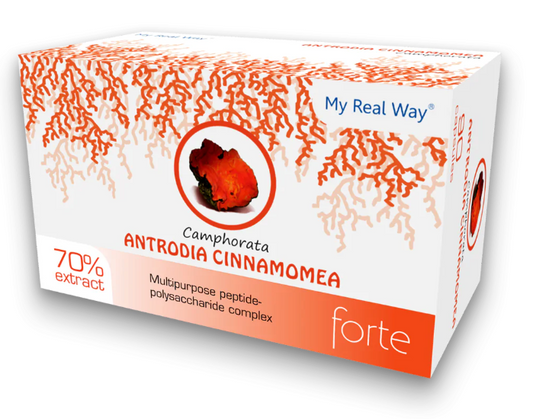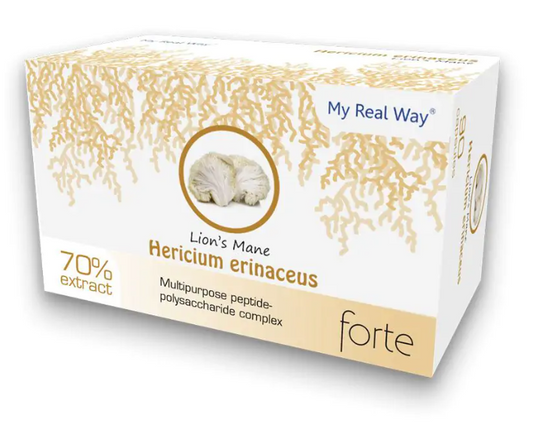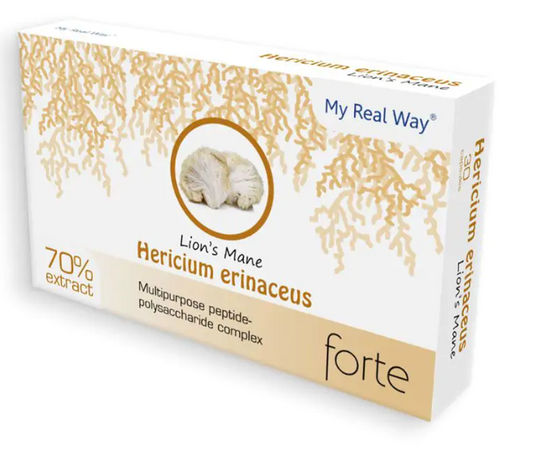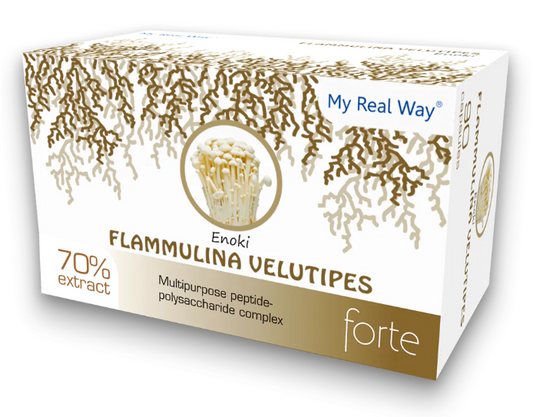
Mushrooms: From the Lab to Everyday Health – The Latest Scientific Discoveries | NaturPeptide
Share
Why do fungi attract so much attention from scientists?
Traditional medicine and modern research
Medicinal mushrooms have been used in traditional Asian medicine for centuries – both as food and as a therapeutic remedy. Chinese, Japanese, and Korean healers observed that certain species helped strengthen the immune system, improve energy levels, and reduce disease symptoms. Today, scientists in laboratories are confirming what ancient healers observed – mushrooms truly possess unique properties.
Biologically active compounds in mushrooms
Mushrooms are characterized by a high content of polysaccharides (especially beta-glucans), triterpenoids, polyphenols, peptides, and other bioactive compounds. These substances act as natural immunomodulators, antioxidants, and anti-inflammatory agents. Recent research suggests that mushrooms may have an effect not only on the immune system, but also on the cardiovascular, hepatic, and nervous systems.
Latest research on the health benefits of medicinal mushrooms
Strengthening the immune system
One of the most studied effects of mushrooms is the regulation of the immune system. Beta-glucans, found in mushrooms such as Shiitake or Agaricus blazei, activate macrophages and NK (natural killer) cells. This helps the body fight infections more effectively and protect itself from external threats.
Anti-inflammatory and antioxidant effects
Chronic inflammatory processes are linked to many diseases, from arthritis to heart problems. Fungi, such as Antrodia Camphorata, contain compounds that reduce cytokine activity, suppress inflammation, and neutralize free radicals. This may help slow the progression of chronic diseases and improve overall well-being.
Mushrooms and the cardiovascular system
Scientific research shows that some mushrooms help lower cholesterol, improve blood circulation, and protect blood vessel walls from oxidative damage. For example, Shiitake mushrooms contain eritadenine – a substance that can positively affect lipid metabolism.
Neurological functions and brain activity
One of the most interesting areas of research is the effect of mushrooms on the brain. Lion's Mane contains compounds that stimulate the production of nerve growth factor (NGF). This can support neuronal regeneration, improve memory and concentration, and may even be beneficial in rehabilitation after nervous system damage.
The most frequently studied medicinal mushrooms
Lion's Mane (Hericium erinaceus)
This mushroom stands out for its neuroprotective properties. Research suggests it may promote nerve cell regeneration, improve cognitive function, and be beneficial in neurodegenerative diseases.
Shiitake (Lentinula edodes)
One of the most popular medicinal mushrooms in the world. Its extracts have antibacterial, anti-inflammatory, and cholesterol-lowering effects. Shiitake is also used to boost the immune system.
Agaricus blazei Murrill
This mushroom is highly valued for its immune-boosting properties. Research suggests it may be beneficial in the prevention and supportive treatment of cancer, as it helps the body fight cancerous cells more effectively.
Antrodia camphorata
A rare mushroom originating from Taiwan. It possesses strong antioxidant and anti-inflammatory effects, protects the liver, supports the cardiovascular system, and reduces fatigue.
Enoki (Flammulina velutipes)
A popular mushroom in Asia, increasingly studied for its immunostimulating and anti-cancer properties. The polysaccharides in enoki activate immune system cells, while its antioxidants help protect cells from damage. Research suggests it may have potential in strengthening the body's resistance to infections and supporting heart health.
From the laboratory to our everyday lives.
How extracts become supplements
Scientists isolate the active compounds from mushrooms, which are then used in the production of food supplements. It is important that the extracts are standardized – this ensures a consistent and effective concentration of active ingredients.
Preventive use and long-term benefits
Mushrooms aren't just helpful when you're sick – they can also be used for preventative care. Regular consumption helps maintain a strong immune system, protect cells from oxidative stress, and support energy balance and vitality.
Conclusions: Future Allies in Health
Medicinal mushrooms have moved from ancient medicine into modern laboratories, and their benefits are increasingly confirmed by scientific research. Today, they are becoming an integral part of a healthy lifestyle – from supporting immunity to promoting heart, brain, and skin health.
The trend is clear: medicinal mushrooms remain one of the most promising natural ways to maintain the body's balance and long-term health.







